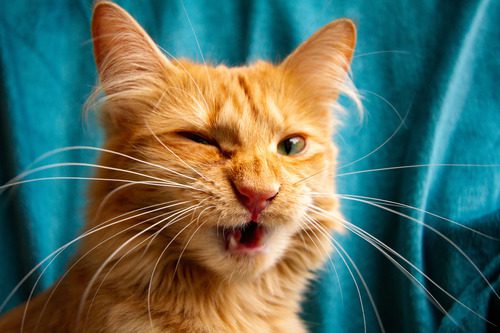Reasons Why Your Cat is Sneezing
If you’ve noticed your cat is sneezing more than usual, it could be a sign of various underlying issues. Sneezing in cats can be as simple as a minor irritation or as complex as a serious health concern. Understanding the potential causes and observing other symptoms can help you determine when a visit to Keystone Animal Hospital in Bradenton, FL, is necessary. This blog explores common reasons why your cat might be sneezing and highlights why professional veterinary insight is vital. If you’re concerned about your cat’s sneezing, call us at (941) 741-8445 for an appointment.

Common Allergens Affecting Cats
Environmental Allergens
Just like humans, cats can be allergic to a variety of substances in their environment. Pollen, mold, dust mites, and even common household cleaning agents can trigger sneezing episodes. If your cat is sneezing frequently, take note of when the sneezing occurs and whether it coincides with specific activities, such as cleaning the house or changing the air filters.
Food Allergies
While not as common as environmental allergens, some cats develop allergies to certain ingredients in their food. This can lead to sneezing, along with other symptoms like itching and digestive upset. If you suspect your cat’s food may be the culprit, a consultation with a vet can lead to dietary adjustments that might help.
Infections That Cause Sneezing
Viral Infections
The most common cause of sneezing in cats is a viral infection, such as the feline herpesvirus or calicivirus. These infections are highly contagious among cats and can cause a range of symptoms, from mild sneezing and runny noses to severe respiratory distress.
Bacterial Infections
A bacterial infection can also be responsible for your cat’s sneezing. Unlike viral infections, bacterial issues might require antibiotics for treatment, which can only be prescribed by a veterinarian.
Physical Irritants and Foreign Bodies
Dust, Smoke, and Fumes
Cats have sensitive respiratory systems, and exposure to smoke, strong perfumes, or other potent fumes can provoke sneezing. Ensuring your home is well-ventilated and free from smoke and strong odors can help minimize irritants for your cat.
Foreign Bodies
Occasionally, a foreign object like a blade of grass or a small piece of debris can become lodged in a cat’s nasal passages, causing frequent sneezing to expel the irritant. If sneezing persists and is accompanied by bleeding or discharge, immediate veterinary attention is needed.
When to Visit Keystone Animal Hospital
It’s important to monitor other symptoms that accompany your cat’s sneezing, such as a runny nose, eye discharge, lethargy, or a decrease in appetite. These signs can help your veterinarian at Keystone Animal Hospital determine the underlying cause and the best treatment plan.
Professional Diagnosis and Treatment
If your cat’s sneezing is frequent and persistent, or if other symptoms develop, please call Keystone Animal Hospital at (941) 741-8445. A professional diagnosis ensures that your cat receives the appropriate care and treatment, avoiding complications that can arise from untreated conditions.
Addressing Your Cat’s Sneezing
Sneezing can be a simple annoyance or a sign of a more serious health issue in cats. By understanding the common causes and knowing when to seek professional help, you can ensure that your cat remains happy and healthy. Remember, if in doubt, it’s always best to consult with your veterinarian to get the right care for your pet.
